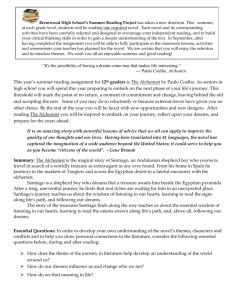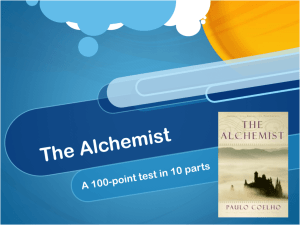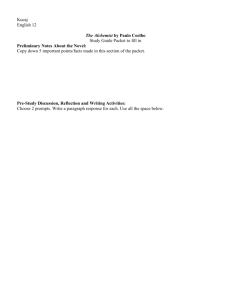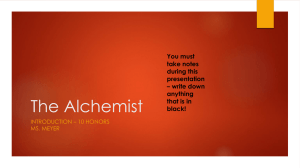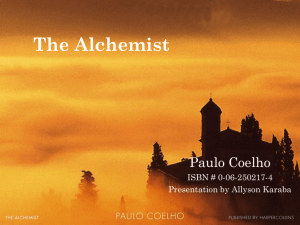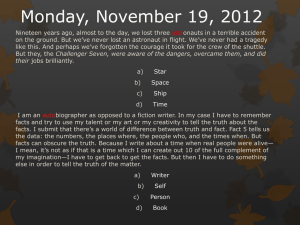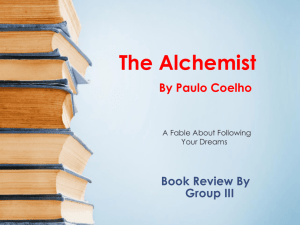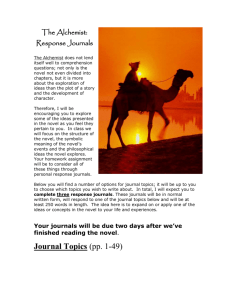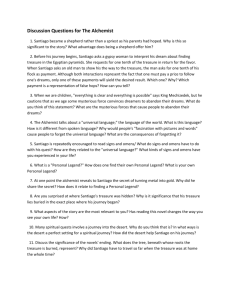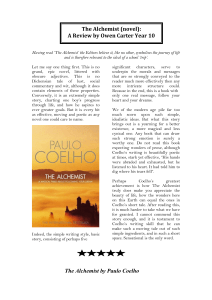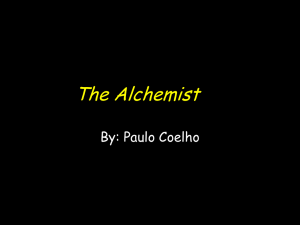The Alchemist - Unit Rationale
advertisement
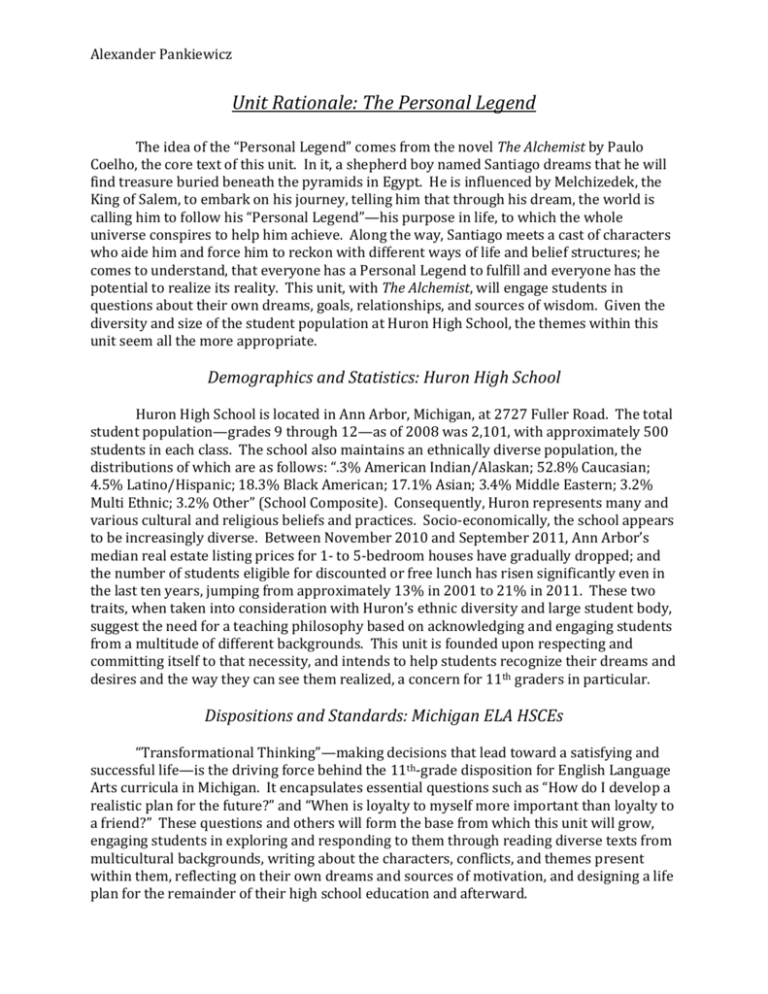
Alexander Pankiewicz Unit Rationale: The Personal Legend The idea of the “Personal Legend” comes from the novel The Alchemist by Paulo Coelho, the core text of this unit. In it, a shepherd boy named Santiago dreams that he will find treasure buried beneath the pyramids in Egypt. He is influenced by Melchizedek, the King of Salem, to embark on his journey, telling him that through his dream, the world is calling him to follow his “Personal Legend”—his purpose in life, to which the whole universe conspires to help him achieve. Along the way, Santiago meets a cast of characters who aide him and force him to reckon with different ways of life and belief structures; he comes to understand, that everyone has a Personal Legend to fulfill and everyone has the potential to realize its reality. This unit, with The Alchemist, will engage students in questions about their own dreams, goals, relationships, and sources of wisdom. Given the diversity and size of the student population at Huron High School, the themes within this unit seem all the more appropriate. Demographics and Statistics: Huron High School Huron High School is located in Ann Arbor, Michigan, at 2727 Fuller Road. The total student population—grades 9 through 12—as of 2008 was 2,101, with approximately 500 students in each class. The school also maintains an ethnically diverse population, the distributions of which are as follows: “.3% American Indian/Alaskan; 52.8% Caucasian; 4.5% Latino/Hispanic; 18.3% Black American; 17.1% Asian; 3.4% Middle Eastern; 3.2% Multi Ethnic; 3.2% Other” (School Composite). Consequently, Huron represents many and various cultural and religious beliefs and practices. Socio-economically, the school appears to be increasingly diverse. Between November 2010 and September 2011, Ann Arbor’s median real estate listing prices for 1- to 5-bedroom houses have gradually dropped; and the number of students eligible for discounted or free lunch has risen significantly even in the last ten years, jumping from approximately 13% in 2001 to 21% in 2011. These two traits, when taken into consideration with Huron’s ethnic diversity and large student body, suggest the need for a teaching philosophy based on acknowledging and engaging students from a multitude of different backgrounds. This unit is founded upon respecting and committing itself to that necessity, and intends to help students recognize their dreams and desires and the way they can see them realized, a concern for 11th graders in particular. Dispositions and Standards: Michigan ELA HSCEs “Transformational Thinking”—making decisions that lead toward a satisfying and successful life—is the driving force behind the 11th-grade disposition for English Language Arts curricula in Michigan. It encapsulates essential questions such as “How do I develop a realistic plan for the future?” and “When is loyalty to myself more important than loyalty to a friend?” These questions and others will form the base from which this unit will grow, engaging students in exploring and responding to them through reading diverse texts from multicultural backgrounds, writing about the characters, conflicts, and themes present within them, reflecting on their own dreams and sources of motivation, and designing a life plan for the remainder of their high school education and afterward. Design and Structure: The Alchemist and Other Texts A major theme recurrent in The Alchemist is the consequences of deciding to ignore our dreams and desires, and the complacency we are relegated to because of our inaction. It is not that we necessarily find whatever our treasure, our purpose in life, but that we have initiated the search, began the journey; that is where Santiago finds real treasure: not in chest of gold at the novel’s end, but in the hardships of his quest and the people he meets. Students at Huron High School—juniors and seniors, especially—are well-aware of the expectations rested upon them, by their teachers, their parents, and their community; these expectations are not only that they become mature, successful adults, but that, as teenagers, they demonstrate the potential to make that future into a reality. And this involves thinking explicitly about the decision-making processes they engage in during this transitional—or “transformational”—time period. As such, we will endeavor to do just that. Using The Alchemist as our crux, they will discuss their dreams and life goals, how they’ve changed between their childhood until now, and what they might become in the future; they will compare their responses to Santiago’s goals, seeing how they differ and are similar, and how they are unrealistic or believable. The students will also read several supporting texts. Closely-related to Coelho’s novel is a story from 1001 Nights, titled “The Ruined Man Who Became Rich Again trough a Dream.” Its title is fairly self-explanatory, albeit equally unbelievable. But it will ideally get students thinking about the need for a realistic and well-thought plan for the future, rather than relying on chance and coincidence. We will also read the story of Narcissus from Ovid’s Metamorphoses, which immediately precedes the opening lines of The Alchemist. Responding to why Coelho chose this tale for an introduction can lead to an interesting discussion about the possible (negative) consequences self-absorption and maintaining a limited perspective on the world around us. This also relates closely to the recurring theme of “vanity” in the novel, introduced with an allusion to the book of Ecclesiastes from the Old Testament: it is important to dwell on how vanity is related to The Personal Legend, and how it could be either a positive or negative trait to embody. Finally, excerpts from Voltaire’s fable Candide, while perhaps difficult, can provide a pretty humorous and informative contrast to the philosophy in The Alchemist: rather than the characters finding wealth and happiness in the end, they end up quite the opposite— ragged, disfigured, and poor. The story illustrates the importance of making sound decisions and understanding the world around you, rather than believing that everything that happens in the world is for the best. Learning Activities and Summative Assessment Some of the activities involved in this unit consist of journal writing, small group projects (class-length investigations of ideas, such as the principles of alchemy, cultural nuances, philosophical underpinnings of world religions, and more), mapping Santiago’s journey from Spain to Africa to track events throughout the plot, visualizing (by drawing) prominent moments in the novel, agree-disagree prompts, comparing our beliefs with those of the characters’ in The Alchemist and other texts, and creating a post-it note timeline of significant moments in the novel. The culminating project of this unit is a written reflective essay about their lifetime goals. They will describe how their goals have changed from childhood to the present, and how they might change from now and into the future. In their essay, they will have to discuss the challenges they expect to face, the people whom they will seek for guidance, and the rewards they stand to gain. And they must compare and contrast their own journey with Santiago’s, drawing support and evidence from the text and our discussions in class, for the purpose of illustrating how believable or unrealistic their own goals seem.
